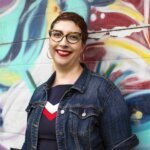I’m not usually one to support mob justice, but this was an exception. Picture this: 40,000 queer and trans athletes and their allies, pouring into Montreal’s Olympic stadium, many from countries where they could be imprisoned, tortured or even killed for being who they are. Many of us had just come out of a seminal four-day conference on gay, lesbian, bisexual and trans human rights, and hadn’t seen or heard a word of welcome from the federal government. Not even a measly letter of congratulations or a Government Of Canada logo on any of the conference materials. We heard from an HIV-positive South African judge, from a lawyer from Cameroon who is defending people thrown in jail on suspicion of being gay, from a Lebanese activist who had to send a video message because her country is being bombed to smithereens. But not a single word from our own government.
So what else were we supposed to do when Michael Fortier, the only unelected member of Harper’s cabinet, got up at the Outgames opening ceremonies to deliver hollow words of congratulations? I would have simply held my applause, if it weren’t for the groundswell of booing that filtered up into the stadium from the athletes on the floor. But when the sound overtook Fortier’s measured speech, I joined the chorus. The moment was just too delicious. While the Conservatives might be intent on rolling back our human rights, this demonstrated that our community won’t sit idly by while they do so. In fact, we’re going to put up a fight. And this time, Fortier was on our turf.
The mainstream media’s response to “l’affaire Fortier” has ranged from bemusement to sneering condemnation. My favourite was Brigitte Pellerin in the Ottawa Citizen, who called the booing queers “ignorant bigots,” writing that “it seems a bit bizarre to claim that not actively endorsing same-sex marriage is an abuse of human rights, especially when there are dozens of countries where homosexuality is illegal, including some where it carries a death sentence.”
Now, I’ll admit that gay marriage is not my favourite issue to work on. I, like many, breathed a sigh of relief last June when the issue was settled by Parliament, because I was looking forward to concentrating on other fights. But the suggestion that our community should just “put up and shut up” is ridiculous — it implies that we should be grateful for what the state has given us (as if we didn’t have to fight tooth and nail every step of the way), accepting second-class citizenship because we are lucky enough not to get stoned for walking down the street.
This is exactly the kind of complacency that I feared would result from the Outgames and its accompanying conference. Because it’s true — compared to the unimaginable consequences of being gay or trans in countries like Syria or Russia, Canadian queers have it good. But with this freedom comes responsibility — to hold our government to account and act as a watchdog to stop the erosion of our rights. And as a teacher from the Netherlands explained to me, progressive laws may provide a framework for the protection of our rights, but they don’t erase homophobia or transphobia on their own. He talked about how in his country, educators are fighting against complacency, and are finding it difficult to find the resources to fight discrimination and promote queer equality in their classrooms.
I was reminded of the teacher’s comments as I rode the metro home from the Outgames opening ceremonies. As hundreds of athletes stepped off the train at Beaudry station (the middle of the gay village), a pack of 13-year old boys got on the metro car and squished in beside me. In an instant, the boys’ homophobic comments and adolescent posturing overtook what had been a glorious queer space. A couple of the other Outgames delegates and I locked eyes and smirked, paralyzed by our inability to come up with a smart-ass response in French. In an instant, it was over — the boys got off the train, and an eerie silence settled over the remaining riders. It’s amazing how quickly we felt stripped of our power. How easily a few flippant comments made us feel like kids getting picked on in school.
I am ashamed that I stayed silent in that moment on the train car. And I am proud that I didn’t when Fortier tried to speak. Because when we lose our voices, we allow oppression to go unchallenged. None of us respond adequately in every situation. But the power of 40,000 queers speaking with one voice is hard to deny.

 Why you can trust Xtra
Why you can trust Xtra


